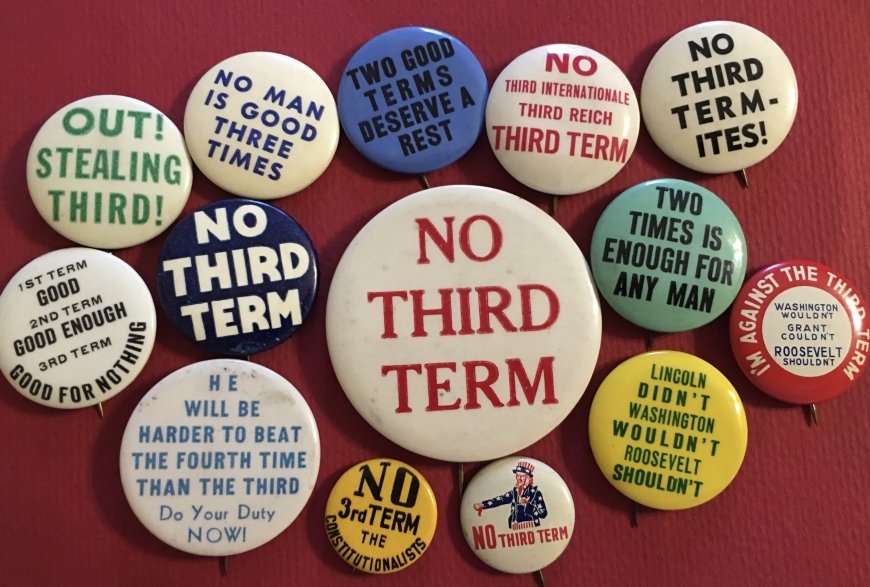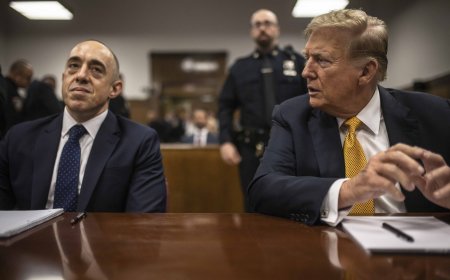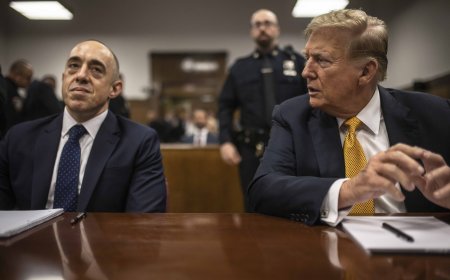Donald Trump’s Third-Term Enablers


One of the mysteries of American life is why lawyers make so much money. My brother Gus, a veteran bankruptcy warrior, once told me it was because, as a class, we are willing to be so much more bored than most people. That explanation has a lot to say for itself. Lawyers spend many hours (billable, to be sure) poring over incomprehensibly verbose jargon printed in indecipherably tiny text.
But I think what brings in the money is not the mere capacity to read dry text but the willingness to misread text.
To understand what I am saying, consider this scenario: As Donald Trump’s second term winds down, Elon Musk announces his candidacy for president in 2028. Immediately, voices in the press and academia say that this is impossible. Article II Sec. 1 cl. 5 of the Constitution provides that “no person except a natural born citizen . . .shall be eligible to the office of President.” Musk was born in Pretoria, South Africa, and held South African citizenship at birth and (through his Canadian mother) Canadian citizenship. He became a naturalized U.S. citizen at 18. Clearly, he is not eligible.
Or . . . is he?
Imagine that Musk produces some high-powered lawyers—perhaps from, I don’t know, Paul, Weiss, or Skadden—to explain that you haven’t read the Constitution right. Musk is a citizen, right? So far, so good. But he wasn’t “natural born”? Not so fast. How do you think he came into this world? He wasn’t grown in a Petri dish, nor did he spring from the brow of Zeus. He was born the natural way, with a human mother and father. It’s regrettable that “natural born citizen” has been misinterpreted for so many years, but luckily, Musk is here to set things right.
Given how much money Musk could shower on Big Law partners and endowed professors, I suspect a small movement would spring up to explain Article II’s “original public meaning” and permit Musk to take office.
This argument is, well, bosh. But it is no more far-fetched than the contention, propounded by some serious scholars, that a president (let’s call him, for the sake of argument, “Trump”) could serve a third term.
An ordinary person, not highly trained in misreading, would consider the wording of the Twenty-Second Amendment—“No person shall be elected to the office of the President more than twice”—pretty doggoned clear. Is Donald Trump a person? (Arguably) Yes. Has he been “elected” President twice? Yes. Could he be “elected” a third time? No.
Ah, not so fast, says the figure with a briefcase. Trump has not even been “elected” vice president once. Even if he had, there is no constitutional limit on how many times a Vice President can be elected. So, the argument runs he could be elected Vice President in 2028. The Twenty-Second Amendment doesn’t say word one about serving three terms as president if one could only attain the office without being elected.
So, okay, what if Trump pulled some stooge off the street (call him, say, “J.D.”) to run for president with Trump as the vice-presidential candidate? Once what’s-his-face is inaugurated, he would resign and, under Sec. 1 of the Twenty-Fifth Amendment, Trump would “become” president—without being elected a third time. (Fantasies of a path to a third term through the vice presidency have been floated before by lawyers and scholars of both parties to imagine four more years for popular presidents like Dwight Eisenhower, Ronald Reagan, Bill Clinton, and Barack Obama).
Slick, yes, but ah, you say, consider the Twelfth Amendment, passed after the chaotic 1800 election nearly led to civil war, which ends with the following prohibition: “[N]o person constitutionally ineligible to the office of President shall be eligible to that of Vice-President of the United States.” Trump’s sinister plot foiled? Not so fast (those billable hours are building up): The Twenty-Second Amendment doesn’t say that Trump is “ineligible to the office” of the presidency. It just says he can’t be “elected” to it.
Now, gentle reader, you are probably dizzy and confused—a stranger and afraid in a world you never made. That world—where words can be tortured like a Salvadoran prisoner—is the one I, alas, live in as a law professor.
In recent years, torturers assaulted the Vesting Clause of the Constitution— “The executive Power shall be vested in a President of the United States of America”—as meaning that the president can fire any federal employee he chooses regardless of statutory protections; the same torturers take the Citizenship Clause—”All persons born or naturalized in the United States, and subject to the jurisdiction thereof, are citizens of the United States and of the State wherein they reside”—and force it to scream, “Yes! Yes! I didn’t mean ‘subject to the jurisdiction’ as ‘subject to the jurisdiction,’ I meant something else so complex that I can’t even put it into words!” They torture the Militia Clause of the Second Amendment (“A well regulated Militia, being necessary to the security of a free State . . . .”) until a troglodyte has a constitutional right to own a bazooka. They made the “Take Care” clause—“he shall take care that the laws be faithfully executed”—“mean” the President can commit any crime he wants and walk free after his term.
The word “eligible” has a constitutional meaning: Article II Sec 1. Cl. 5 provides that “No Person except a natural born Citizen, or a Citizen of the United States, at the time of the Adoption of this Constitution, shall be eligible to the Office of President; neither shall any Person be eligible to that Office who shall not have attained to the Age of thirty five Years, and been fourteen Years a Resident within the United States.” Would anyone argue with a straight face that a 14-year-old could be appointed Vice President and “become” president? Of course not. Don’t believe me: ask The Oxford English Dictionary: “ineligible” means, and meant in 1804 when the Twelfth Amendment was adopted, “incapable of being elected; legally or officially disqualified for election to an office or position.” So the Twelfth Amendment means that Trump could not be “elected” vice-president because he can’t be “elected” president. And if he is not “elected” Vice President, he cannot succeed himself in 2029.
Wait! Why couldn’t the Republicans run a ticket of “J.D.” and (say) “Pete Hegseth,” once they are elected, have Hegseth resign as Vice President and J.D. appoint Trump as Vice President and then resign, allowing Trump to “become” president? Or what if another stooge in Congress (call him Mike) resigns as speaker, permitting the Republican majority to elect Trump as Speaker and become “acting President” under the Presidential Selection Act?
What I say to that is: Oh, shut up.
The answer to this and a lot of other supposed conundrums under the Constitution is the one that George Orwell gave in 1936: “I have a sort of belly-to-earth attitude and always feel uneasy when I get away from the ordinary world where grass is green, stones hard, etc.” My guess is that this is the way most Americans read their Constitution.
To apply the belly-to-earth hermeneutic to this issue, I will quote Brian Kalt of the Michigan State University College of Law, whose books are the best guides to constitutional brain teasers of this kind. “This really gets to the heart of people’s different views of how to interpret the Constitution because the loophole only emerges if you’re really strictly limiting yourself to the text,” Kalt told The Hill. “If you’re saying, well, what’s the point of the 22nd Amendment? What is it trying to accomplish? What it’s trying to accomplish is, if you have two terms, then you leave and that’s it.” In other words, the Constitution belongs to the people, not to sophists; in most places, it means what a sane speaker of English would think it means—and in this situation, it means no third term for anybody.
As White House correspondent Tyler Pager recently wrote in The New York Times, Trump’s third-term musing is likely a feint meant to distract from the constitutional violations (and crimes) he commits daily. Beyond that, it makes it harder for any Republican politician to emerge as heir. I am also sure when he wakes in the night to post on social media, he imagines his Nobel address, his face on Mt. Rushmore, and his coronation as the Emperor of Kalaallit Nunaat; Trump really thinks a grateful nation may reward him with one term more than Barack Obama won.
But it’s vanishingly unlikely in practice, even if Trump retains his iron grip on the GOP. History shows that very few Presidents could serve a third term. Politics can turn toxic for one thing; for another, the strain of the office itself often renders a third term physically impossible. George Washington spurned Hamilton’s third-term entreaties, arguing that even he could not prevent the bitter partisanship emerging during his second term; Washington died at 69, a year before his third term would have ended. Woodrow Wilson dreamed of a third term but was forced into retirement by a stroke at 63. Franklin Roosevelt won four terms but was barely into his fourth when he died of a cerebral hemorrhage at the same age, 63. Dwight Eisenhower remained popular but suffered a severe heart attack, an intestinal blockage, and a stroke while in office. He left office at 70 and died at 79. Lyndon Johnson, who entered office wildly popular, left the White House a broken man six years later and died at 64. Ronald Reagan’s health broke at the beginning of his second term, as depression led his cabinet to consider invoking the Twenty-Fifth Amendment. He died in 2004 at 93, having suffered dementia for at least a decade.
One thing to note: except for Reagan, each of these casualties of office was younger than Trump, who is 79; he may dream of a third term, but history—and the actuarial tables—suggest that that national nightmare will remain another one of his fevered dreams.
The post Donald Trump’s Third-Term Enablers appeared first on Washington Monthly.












































